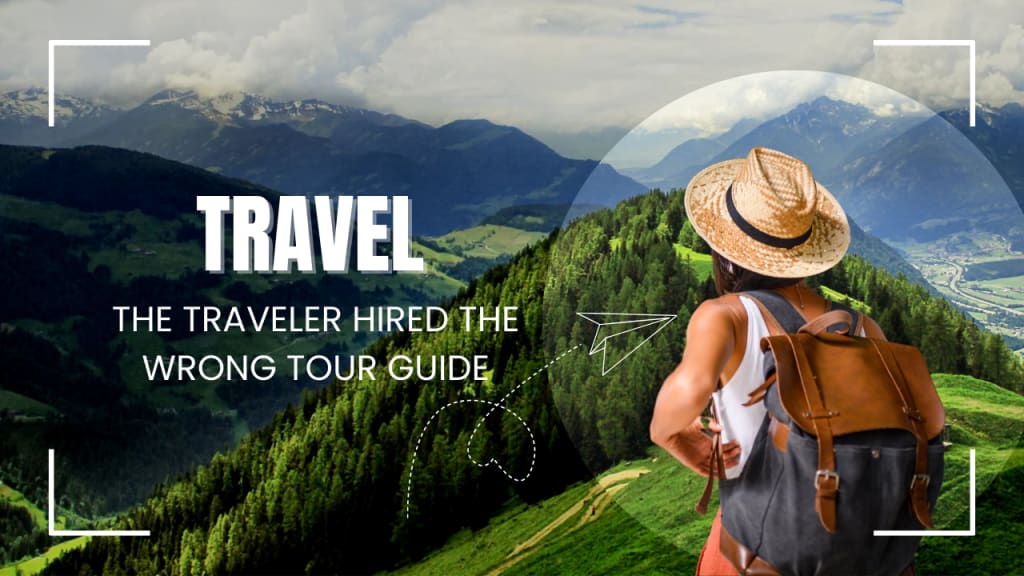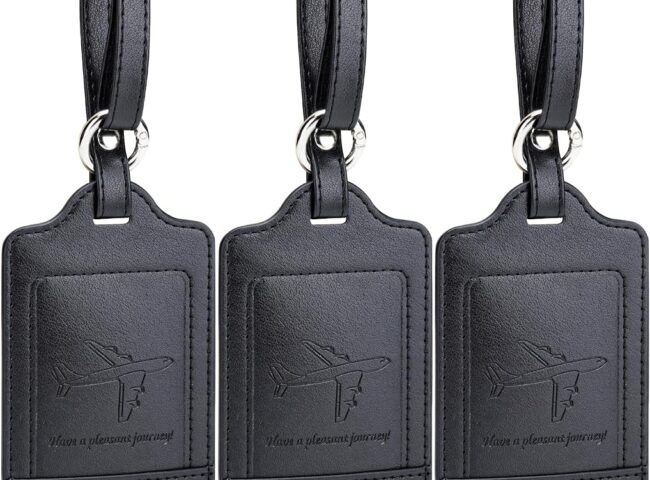Traveling is exciting. It opens doors to new places and cultures.
A good tour guide can make all the difference. But what happens when a traveler hires the wrong one? Imagine exploring a beautiful city. You expect stories, insights, and hidden gems. Instead, you find confusion, missed attractions, and a lack of knowledge.
The traveler hired the wrong tour guide that can turn a dream trip into a frustrating experience. Many travelers face this issue. They may not know how to choose the right guide. Some get caught up in flashy ads or low prices. Understanding the importance of a skilled tour guide is key. This blog will explore what can go wrong and how to find the right guide for your next adventure.

Credit: chillwavez.com
Choosing The Right Guide
Choosing the right tour guide can make or break your travel experience. A skilled guide adds depth and enjoyment to your journey. The wrong guide can lead to confusion, missed opportunities, and disappointment. Knowing how to choose wisely is essential.
Researching Qualifications
Researching qualifications is a vital step in selecting a tour guide. A qualified guide enhances your trip with knowledge and expertise. Here are some key factors to consider:
-
- Certification: Check if the guide has any professional certifications.
-
- Experience: Look for guides with experience in the specific area you are visiting.
-
- Language Skills: Ensure the guide speaks your language fluently.
To help with your research, here’s a simple table with essential qualifications:
| Qualification | Importance |
|---|---|
| Certification | Shows professional training and commitment. |
| Experience | Indicates familiarity with local customs and history. |
| Language Skills | Ensures clear communication during the tour. |
Check local tourism boards for recommended guides. This can give you a good starting point. Remember, a well-qualified guide is a key part of a successful trip.
Reading Reviews
Reading reviews helps you gauge the quality of a tour guide. Positive feedback can boost your confidence in your choice. Look for reviews on various platforms.
-
- Travel Websites: Sites like TripAdvisor offer many user reviews.
-
- Social Media: Check posts and comments on social platforms.
-
- Word of Mouth: Ask friends or family for recommendations.
Pay attention to specific details in reviews:
-
- Did the guide provide valuable information?
-
- Was the guide friendly and engaging?
-
- Were the tours well-organized and punctual?
Beware of fake reviews. Look for patterns in feedback. A mix of positive and negative reviews can give a balanced view. Choose a guide with consistently good ratings. This can lead to a more enjoyable experience.
Common Red Flags
Choosing the right tour guide is crucial for a great travel experience. Many travelers face problems because they hired the wrong guide. Common red flags can help you spot these issues early. Recognizing these signs can save you time and money. Let’s explore two major red flags: lack of communication and unclear itineraries.
Lack Of Communication
Good communication is vital when hiring a tour guide. A guide should be clear and responsive. If you notice these signs, beware:
-
- Delayed Responses: If emails and messages take too long to answer, it’s a problem.
-
- Vague Answers: If the guide gives unclear or confusing answers, reconsider.
-
- No Contact Information: A reliable guide shares their phone number or email. If they don’t, it raises a red flag.
Here’s a simple table to summarize these points:
| Red Flag | Description |
|---|---|
| Delayed Responses | Long wait times for replies or no replies at all. |
| Vague Answers | Unclear or confusing responses to your questions. |
| No Contact Info | Failure to provide a way to reach them directly. |
These signs can lead to misunderstandings. A tour guide should make you feel confident and informed. If they do not, it’s time to look for someone else.
Unclear Itineraries
An itinerary is a guide’s plan for your trip. It should be clear and detailed. If the itinerary is vague, it can cause problems. Look for these signs:
-
- No Detailed Schedule: A good itinerary lists times and locations for each activity.
-
- Last-Minute Changes: Frequent changes can indicate poor planning.
-
- Lack of Highlights: An unclear itinerary may miss important sites or experiences.
Here’s a quick overview:
| Itinerary Issue | Explanation |
|---|---|
| No Detailed Schedule | Missing times and locations for activities. |
| Last-Minute Changes | Unexpected changes that disrupt your plans. |
| Lack of Highlights | Not including important attractions or activities. |
Clear itineraries help travelers know what to expect. They create a smooth journey. If the guide cannot provide this, it may be time to rethink your choice.
Expectations Vs. Reality
The joy of travel comes from new experiences. Travelers often have high hopes for their adventures. They dream of learning, exploring, and making memories. However, these dreams can clash with reality. This often happens when a traveler hires the wrong tour guide. The guide’s approach may not match the traveler’s expectations. The result? Disappointment. Understanding these gaps can help future travelers avoid similar mistakes.
Misaligned Goals
Travelers and tour guides often have different goals. Misalignment can create a frustrating experience.
For example, a traveler may want a deep cultural experience. They seek local food, history, and traditions. The guide, however, might focus on popular tourist spots. They may take the group to crowded places with little value. This creates a gap between what the traveler wants and what they get.
Here are common misaligned goals:
-
- Traveler’s Goals:
-
- Explore local culture
-
- Try authentic cuisine
-
- Learn about history
-
- Traveler’s Goals:
-
- Guide’s Goals:
-
- Visit famous landmarks
-
- Follow a strict schedule
-
- Minimize time spent at each stop
-
- Guide’s Goals:
This mismatch leads to dissatisfaction. Travelers may feel rushed or bored. They miss the chance to connect with the place. A simple checklist can help align goals before the trip.
| Traveler’s Goals | Guide’s Approach |
|---|---|
| Seek authentic experiences | Focus on tourist traps |
| Desire meaningful interactions | Stick to scripted tours |
Cultural Misunderstandings
Cultural misunderstandings can lead to a challenging experience. A guide may not fully understand the traveler’s background. Language barriers can also create confusion.
Imagine a traveler who wants to try local dishes. They are excited about street food. The guide, however, avoids street vendors. They might think it’s unsafe. This disconnect can lead to frustration.
Common cultural misunderstandings include:
-
- Different eating habits: Travelers may want to eat like locals. Guides may suggest restaurants instead.
-
- Different pacing: Some travelers prefer to explore slowly. Others want quick stops. Guides may not adjust their pace.
-
- Varied interests: A traveler may love art. The guide may focus on history instead.
Understanding these differences is crucial. Travelers should communicate their desires clearly. Guides must listen and adapt. This way, the journey becomes enjoyable for everyone.

Credit: vocal.media
Impact On The Trip
Hiring a tour guide can change your travel experience. A good guide offers insight and local knowledge. A wrong choice can lead to problems. The impact of hiring the wrong tour guide can affect your entire trip. It can lead to lost time and missed experiences. Understanding these impacts helps travelers make better choices.
Lost Time
Lost time is one of the biggest issues when a traveler hires the wrong tour guide. A poor guide may not stick to the schedule. This can cause delays that affect the whole trip.
Imagine this situation:
-
- You plan to visit three attractions in one day.
-
- Your guide takes too long at the first stop.
-
- You miss the chance to see the other two places.
This wasted time is frustrating. You may also miss important activities. Here’s a table showing the impact of lost time:
| Activity | Planned Time | Actual Time | Time Lost |
|---|---|---|---|
| Attraction 1 | 2 hours | 3 hours | 1 hour |
| Attraction 2 | 1.5 hours | N/A | 1.5 hours |
| Attraction 3 | 1 hour | N/A | 1 hour |
This table shows how lost time builds up. Each hour lost means less enjoyment. Travelers feel rushed and unhappy. They miss out on taking pictures or enjoying the scenery.
Missed Experiences
Missed experiences can ruin a trip. A wrong tour guide may skip important sites. This leads to feelings of disappointment.
Think about the experiences you might miss:
-
- Local cuisine tastings
-
- Hidden gems not on the main path
-
- Cultural events and festivals
Each missed opportunity adds to the regret. Here are examples of what travelers might miss:
| Experience | Importance | Impact of Missing |
|---|---|---|
| Local Cuisine | Try authentic dishes | Limited culinary experience |
| Hidden Gems | Unique spots | No memorable photos |
| Cultural Events | Connect with locals | Lost understanding of local life |
These missed experiences create lasting regrets. Travelers often go home feeling unsatisfied. They realize they did not see what mattered most. A good tour guide makes sure these experiences happen. The right guide enriches your trip.
Handling Mistakes
Travel is meant to be enjoyable. It should be filled with new experiences and learning. But what happens when a traveler hires the wrong tour guide? Mistakes can happen. Handling these mistakes is key to ensuring a successful trip. Knowing how to address issues and seek alternatives can turn a bad experience into a memorable one.
Addressing Issues
First, identify the specific problems with the tour guide. Was the guide unprepared? Did they lack knowledge? Did they ignore your interests? Clearly defining the issues helps in finding a solution.
Here are some common issues travelers face:
-
- Unclear communication
-
- Lack of enthusiasm
-
- Failure to follow the itinerary
-
- Poor time management
Once you identify the problems, take action:
-
- Speak up. Politely express your concerns to the guide.
-
- Ask questions. Request clarification on points that are unclear.
-
- Document issues. Write down specific examples for reference.
-
- Be constructive. Suggest changes that could improve the experience.
Most tour guides appreciate feedback. They want to improve. If the guide responds positively, the situation may improve. If not, consider your options carefully.
Seeking Alternatives
Sometimes, the best option is to find a new guide. If issues persist after addressing them, alternatives may be necessary. Start by researching other guides in the area.
Here’s how to find a better tour guide:
-
- Check online reviews.
-
- Ask for recommendations from fellow travelers.
-
- Contact local tourism offices for suggestions.
-
- Look for specialized guides based on your interests.
Consider the following table for comparing options:
| Tour Guide | Rating | Specialty | Price |
|---|---|---|---|
| Guide A | 4.5 | Cultural Tours | $100 |
| Guide B | 4.0 | Adventure Tours | $120 |
| Guide C | 4.8 | Historical Tours | $95 |
After you find potential guides, reach out. Ask about their experience and approach. This helps ensure a better fit. A new guide can lead to a more enjoyable experience. Don’t hesitate to make the switch.

Credit: dubaiweeklys.com
Learning From Experience
Traveling can be an exciting adventure. But hiring the wrong tour guide can turn it into a nightmare. Learning from this experience helps travelers make better choices in the future. Mistakes happen, but they can also teach valuable lessons. Understanding what went wrong can improve future trips.
Reflecting On Choices
Every traveler has made a choice they regret. Reflecting on these choices is important. It helps identify what went wrong. Here are some common mistakes when hiring a tour guide:
-
- Not checking reviews.
-
- Choosing based on price alone.
-
- Ignoring recommendations from friends.
-
- Failing to ask questions before booking.
These mistakes can lead to poor experiences. For example, a traveler might choose a guide with low rates. This often means less experience or bad reviews. A simple table can show how to evaluate a guide:
| Criteria | Importance | Questions to Ask |
|---|---|---|
| Experience | High | How many tours have you led? |
| Reviews | High | Can I see your reviews or testimonials? |
| Price | Medium | What is included in the price? |
| Communication | High | How will we communicate during the tour? |
Taking time to reflect can prevent future mistakes. Understanding what to look for makes a difference. Travelers can feel more confident in their choices.
Improving Future Plans
After a poor experience, it’s time to improve future plans. Start by researching potential guides. Use websites and social media to find trustworthy options. Here are some steps to follow:
-
- Read multiple reviews online.
-
- Ask friends or family for recommendations.
-
- Contact potential guides and ask questions.
-
- Compare prices and services carefully.
Planning ahead can save time and money. Create a checklist of what’s needed for hiring a guide. This can include:
-
- Experience level
-
- Language skills
-
- Specialty in certain tours
-
- Flexibility in scheduling
Also, consider what you want from the tour. Specific interests lead to better choices. For example, are you interested in culture, food, or adventure? Knowing this helps narrow down options.
Future trips can be enjoyable with the right guide. Taking time to plan makes all the difference.
Sharing Stories
Traveling brings excitement and adventure. But what happens when you hire the wrong tour guide? Stories from travelers can teach us valuable lessons. Sharing these stories helps others avoid similar mistakes. Each experience adds to the rich tapestry of travel tales. Let’s explore how travel blogs and social media posts highlight these experiences.
Travel Blogs
Travel blogs are a great way for people to share their stories. Many travelers write about their experiences with tour guides. They share both good and bad moments. These stories can help others choose wisely. Here are some common themes found in travel blogs:
-
- Unprofessional behavior from tour guides.
-
- Lack of knowledge about local culture.
-
- Failure to meet expectations set during booking.
Many travelers share their stories in detailed posts. They describe what went wrong and how it affected their trip. Here’s an example of a blog post structure:
| Section | Description |
|---|---|
| Introduction | Briefly introduce the tour and guide. |
| Experience | Detail what happened during the tour. |
| Lessons Learned | Share what others can learn from the experience. |
Travel blogs often have personal touches. They include photos and anecdotes. This makes the stories more relatable. Readers find comfort in knowing they are not alone in their experiences.
Social Media Posts
Social media is another platform for sharing travel stories. Many travelers post about their experiences in real-time. Platforms like Instagram and Twitter are popular choices. Short and engaging posts reach a wide audience quickly. Here are some key points about social media travel stories:
-
- Quick updates about a tour gone wrong.
-
- Photos that capture the moment.
-
- Use of hashtags to increase visibility.
Travelers often share tips in their posts. They advise others on which guides to avoid. Here’s an example of a typical social media post:
"Just finished a tour with XYZ Guide. It was a nightmare! They had no idea about the local history. Save your money and find a better option!"
These posts can spark conversations. People share similar experiences in comments. Social media serves as a valuable resource for travelers. It encourages sharing and learning from each other.
Tips For Future Travelers
Hiring the right tour guide can make or break your travel experience. Many travelers have faced the disappointment of hiring the wrong guide. The experience can lead to confusion and wasted time. To avoid this situation, future travelers should focus on asking the right questions and building a good rapport with their guides.
Questions To Ask
Before hiring a tour guide, asking the right questions is crucial. This helps ensure you choose someone who fits your needs. Here are some important questions to consider:
-
- What is your experience? Ask how long they have been guiding tours.
-
- What areas do you specialize in? Find out if they know the local culture and history.
-
- Can you share references? Look for reviews from past clients.
-
- What is included in the tour? Know what to expect regarding transportation, meals, and entry fees.
-
- What is your cancellation policy? Understand the rules if plans change.
Consider creating a table to compare potential guides:
| Guide Name | Experience | Specialization | References | Price |
|---|---|---|---|---|
| Guide A | 5 years | Cultural Tours | Available | $100 |
| Guide B | 10 years | Adventure Tours | Available | $150 |
Asking these questions helps clarify your expectations and the guide’s abilities.
Building Rapport
Building a good relationship with your tour guide is just as important as their skills. A friendly guide can enhance your experience. Start by being open and approachable. Here are some tips to build rapport:
-
- Be polite and respectful. Treat them as a partner in your journey.
-
- Share your interests. Let them know what you want to see and learn.
-
- Ask about their stories. This creates a personal connection.
-
- Be open to their suggestions. They know the area well and can offer hidden gems.
Finding common ground can make the tour more enjoyable. Consider discussing:
-
- Local foods you want to try.
-
- Activities you enjoy.
-
- Questions about local customs.
Building this connection can lead to a more memorable experience. A good rapport often results in better service and a more personalized tour.
Frequently Asked Questions
Why Is Hiring The Right Tour Guide Important?
Hiring the right tour guide enhances your travel experience. A knowledgeable guide can provide insights and local culture that enrich your understanding. An experienced guide helps you avoid common pitfalls and ensures your safety. Choosing wisely can lead to unforgettable memories and enjoyable adventures.
What Are The Signs Of A Bad Tour Guide?
Signs of a bad tour guide include poor communication skills and lack of knowledge. If a guide seems disorganized or uninterested, it’s a red flag. Additionally, if they don’t respect your preferences or offer limited engagement, consider finding a new guide.
A good guide should enhance your journey.
How Can I Find A Reliable Tour Guide?
To find a reliable tour guide, check online reviews and ratings. Ask for recommendations from friends or travel forums for honest feedback. Look for guides with relevant experience and certifications. An interview or initial conversation can also reveal their professionalism and compatibility with your travel style.
What Should I Ask A Tour Guide Before Hiring?
Before hiring a tour guide, ask about their experience and specialization. Inquire about their cancellation policy and group size limits. Clarify what’s included in the tour and any additional costs. Understanding their approach to safety and local customs can also help you make an informed decision.
Conclusion
Choosing the right tour guide is vital for a good trip. A poor choice can lead to disappointment and frustration. Researching guides before hiring is essential. Read reviews and ask for recommendations. Trust your instincts when meeting potential guides. A great guide can enhance your travel experience.
They can share stories and insights that make your journey memorable. Avoid mistakes by being careful in your selection. Travel should be enjoyable and enriching. Don’t let a wrong choice ruin your adventure. Make informed decisions for a better trip.
Your next travel experience deserves the best guide. visit your another page click now






